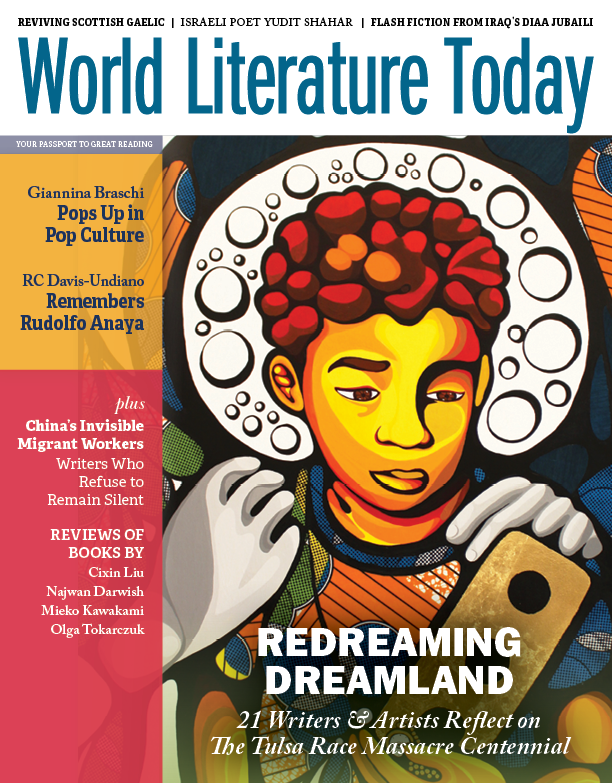Publishing on the Margins: A Conversation with Argentine Artisan Publisher and Poet Eric Schierloh

I first came across Eric Schierloh’s multifaceted cultural artisanry imprint Barba de Abejas (Bee beard) when I was gifted a copy of Richard Brautigan’s Please Plant This Book. Eager to read the poems in Spanish, my then one-dimensional approach to books, I carefully opened the object unable to overlook the detail in each item. To my surprise, out fell eight envelopes from a peculiar binding that had subverted the traditional text block. Each side of the envelopes donned a poem in either Spanish or English enfolding a seed between each version of the text. Also included was a book of Schierloh’s own poetry written while representing Argentina at the Guadalajara International Book Fair and a hand-painted watercolor portrait of Brautigan. Perusing this offbeat compilation became the defining moment that began to expand my relationship with books, the written word, translation, and the circulation of it all.
Reaching ten years at the end of 2020, Barba de Abejas has released forty-six titles of more than thirty authors, and around 6,600 books along with 1,900 chapbooks—each one made by hand and including ancient text to contemporary poetry. Eric was willing to answer a few questions to discuss artisan publishing and his advocacy for publishing on the margins, outside of the industrial publishing complex.
Paul Holzman: What was the tipping point to go DIY and to bring the entire process into your home? Tell me about the moment you decided to plan, lay out, print, and hand-make your first book.
Eric Schierloh: It was at the end of 2010, and it had to do with two things: a certain “disappointment” regarding the dynamics of the industrial publishing system and having come across, by pure chance, the case of Ulises Carrión while in Guadalajara, Mexico. A very talented artist who transcended the frontiers of literature in order to make the manufacturing and publishing of things almost intrinsically linked to writing, Carrión speaks of the modern writer in terms of someone cut off from the material conditions of book production, and that was the exact split I had experienced publishing industrial books in small independent publishing houses. It took me a year and a half to get a grasp on all this and to teach myself the craft of editing (which includes publishing and distribution), the designing of books, and bookbinding.
Holzman: The bilingual edition of Richard Brautigan was the first book I read from your catalog. What led you to the decision for an international catalog?
Schierloh: In Argentina, and in Latin America at large, I would say we have a reading culture deeply rooted in other languages and their cultural productions. I suppose this is so, at least in part, because of the very history of our continent and its nations. Understanding this, and knowing how to take advantage of it editorially, is important so that a small publishing house is not reduced by obligation, say, to the publication of contemporary writings in one’s own language and region; materials that, in any case, coexist in many of the catalogs focused on translation. But in addition to being a tool for economic survival, “peripheral” translation, by which I mean translations not coming from either Spain or Mexico, not at the helm of publishers from the large conglomerates in book publishing, and often not by “professional” translators either. This allows us to dispute certain legitimacies and rights of access to culture within a very diverse idiomatic “zone” of almost six hundred million speakers.
Holzman: Just over ten years old, Barba de Abeja’s most recent catalog has included an all-star compilation of what I would consider iconoclasts of publishing as we know it: Ethel Mairet, Morris Cox, Soetsu Yanagi, Eric Gill, to name a few. What do they offer independent publishers and other at-home publishers who find themselves in the shadow of today’s industrial publishing system?
Schierloh: Let’s add William Morris and Ulises Carrión to the list! All of them were deeply involved with artisan work, both slow and small-scale production and with the development of various crafts. At the same time, they were looking for an alternative to the industrial production and distribution system, and that search, of course, is still going on. Also, the translation and dissemination of these individuals’ theoretical texts, along with various manuals for different crafts and operations of old machinery such as letterpress printing, mimeograph, binding methods, and distribution alternatives—although anachronistic—each offer enormous possibilities today. It seems to me equally relevant and central to continue promoting self-publishing and artisan publishing.
Poetry is one of the oldest languages and at the same time a way of being and relating within the world that goes through the ages.
Holzman: And it fascinates me that Barba de Abejas fosters that while also carrying on those traditions into the present reality of the Americas, specifically to the Southern Cone of South America, such as the very exciting and upcoming contemporary poetry you are publishing this year. Tell us about the coexistence of this American Southern Cone poetry with the likes of, say, Melville, Emerson, and Enslin today within the context of artisan publishing?
Schierloh: Well, I think that poetry has a certain natural ability to accompany any other practice, and that perhaps has to do with the fact that poetry is one of the oldest languages and at the same time a way of being and relating within the world that goes through the ages. The last important impulse that poetry had here in Argentina was in the 1990s, and it had to do with poets who undertook self-publishing and who laid the foundations, in some ways, of what we can call today artisan publishing: a more democratic, more diverse, and, yes, “poetic” space, so to speak, opposed to a certain general barrenness in the industrial publishing system.
Holzman: I was able to attend one of your workshops, and you emphasized community and interdependence being vital characteristics in the curation, dissemination, and democratization of culture. Can you share how that plays out at Barba de Abejas?
Schierloh: Community is essential, and as a translator, editor, and bookbinder, one keeps both in mind all the time. The ideas of responsible and proximity commerce, of collaboration with sustainability and self-management, are unfeasible without a reading community that in turn is part of the ecosystem of the culture of texts and books. Values that have to do with greater participation by authors, a more committed relationship on the part of bookstores, and a solidarity-interdependence with other publishers are fundamental. I believe that the long-term challenge is to break down the local and national borders and build ties with other artisan publishing projects in the rest of the continent and, why not, the world.
The long-term challenge is to break down the local and national borders and build ties with other artisan publishing projects in the rest of the continent and, why not, the world.
Holzman: Tell me about the Artisan Publishing Workshops you have given both regionally and abroad. Do you consider them a tool for empowerment and resistance against neoliberal forces in Latin America and beyond?
Schierloh: I started sharing the Artisan Publishing Workshops (both personal and itinerant as well as virtual) because I believe that it is necessary to expand the production of books on a small scale, and especially in those places far from large urban centers. The production of texts and writing has become massive in certain ways, and more democratic, and that is not so for publications and printed materials. Sharing experience, information, and practices is a way of engaging with the community that supports publishing projects, and legitimately seeks to grow it bigger. We need a larger number of small, dispersed publishers, not bigger publishing houses that are concentrated around one or two multinationals. It can be said that this is yet another dispute and, in a way, has to do with the activism practiced by every artisan publisher.
Holzman: You recently announced the Archivo Digital Barba de Abejas (Barba de Abejas Digital Archive). You announced it stating it was “created with the main goal to see texts reach places that the book cannot.” Can you expound on that?
Schierloh: As for readers, books are very expensive goods when mailing internationally; everyone knows that. The digital file of a text is designed to amend this in part, allowing access to some of the texts in the catalog. On the other hand, this circulation of the texts can help establish contact with other publishers (especially artisan publishers) who would like to publish some of the texts in their distant places of residence. I have this idea about books as an irreplaceable experience—especially those made by hand—but it is true that texts, those entities that can be very easily transformed into ones and zeros, do much better when navigating through space.
Holzman: What does it mean for you to have the support of La Alliance Internationale des Éditeurs Indépendants when navigating through this new space?
Schierloh: Well, in the first place, it was a big and pleasant surprise. It’s an acknowledgment also, in a certain way, or at least that’s how I feel about it. As for the financial aid, I would say that it will allow me to dedicate more time to the development of the project and the design of the files, which to some degree I envision more as devices similar to analog books. Meaning that they are fixed like a pdf, not fluid like an ePub, without links, and that you need to “buy” in an artisanal way by writing an email to the publisher.
Translation is a central part of the catalogs. Many of the most recent artisan publishers are, precisely, translators.
Holzman: So how can artisan publishing be sustainable as the publishing industry heralds the opposite?
Schierloh: There are many factors that take part in the “sustainability” of an artisan publishing project. I think there is a new appeal for the book as object, and especially for the handmade book that has carefully chosen materials and a series of crafts that can almost “naturally” endow the text with abundant form and material diversity, compared to the uniformity that prevails in industrial and digital productions. The fact that the publications also circulate in an artisanal way, at fairs or with sales going out via snail mail, contributes to the creation of a very strong reading community around each publishing project. Finally, and this is a very important identity trait for some of the most recent artisan publishers in Argentina (among them Barba de Abejas), translation is a central part of the catalogs. Many of the most recent artisan publishers are, precisely, translators.
December 2020 / January 2021
Translation from the Spanish
Editorial note: Read an essay, “How to Prepare Yourself for the Collapse of the Industrial Publishing System,” by Eric Schierloh in WLT’s Spring 2021 issue.













